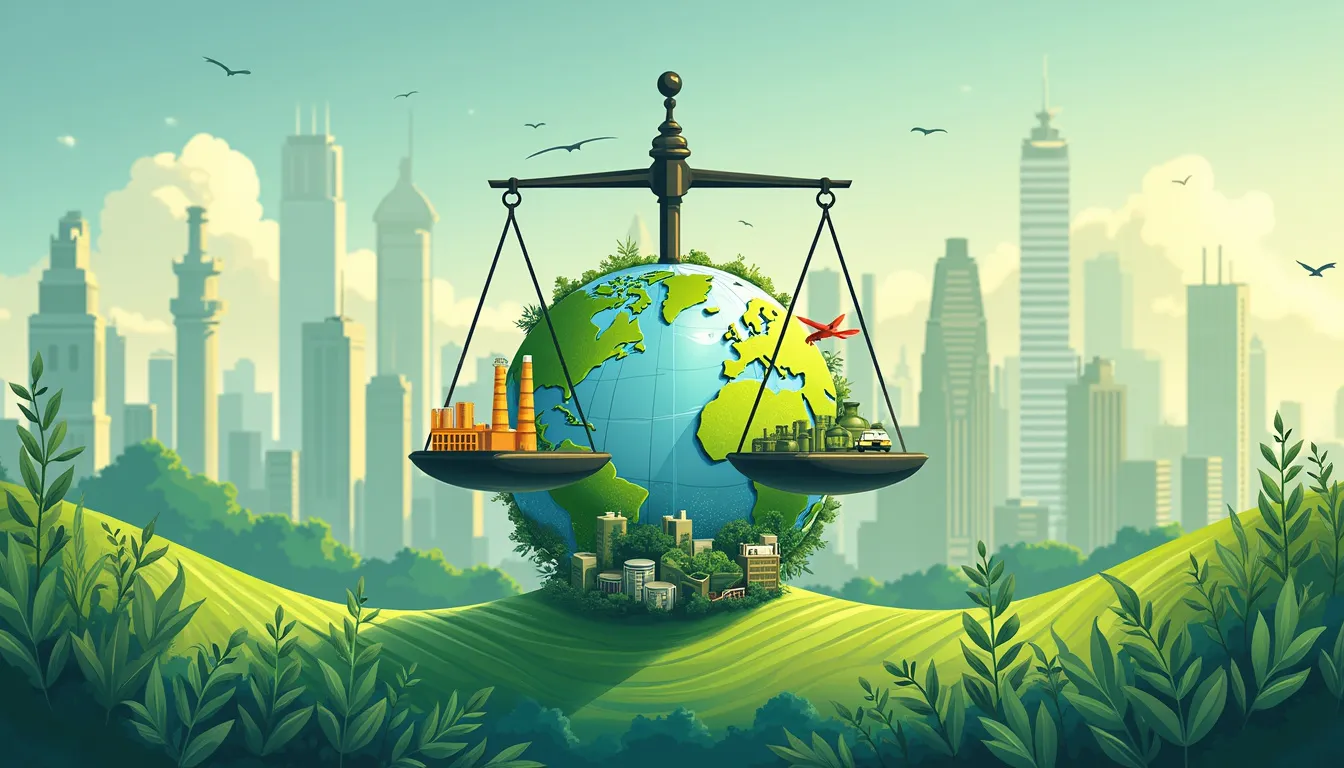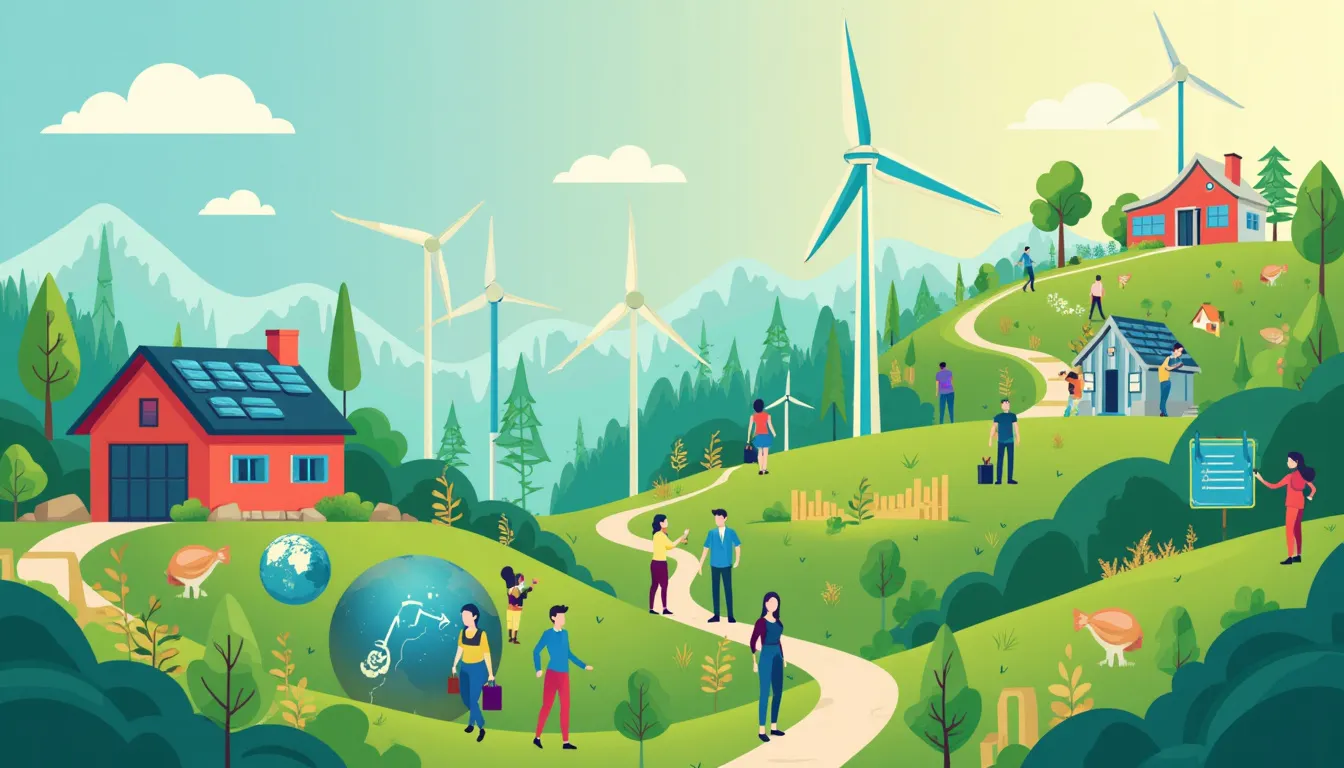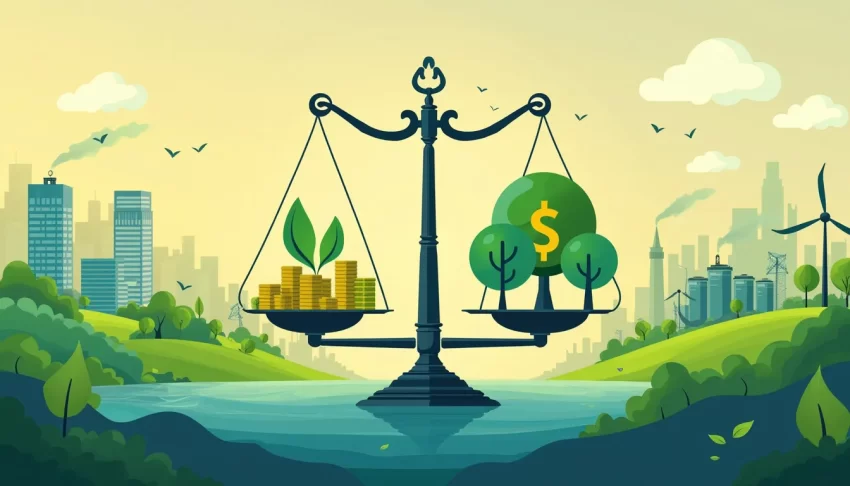In today’s rapidly evolving world, where environmental challenges and economic uncertainties intertwine, understanding the key principles of economic sustainability has never been more critical. Economic sustainability isn’t just a buzzword; it’s a crucial framework that ensures our financial systems can support long-term prosperity without depleting natural resources or exacerbating social inequalities. At its core, economic sustainability seeks to strike a balance between fiscal responsibility, environmental stewardship, and social equity, forming the bedrock of resilient and thriving global and local economies.
By fostering practices that prioritize efficient resource management, long-term financial planning, and the equitable distribution of wealth, economic sustainability helps create robust systems capable of withstanding economic shocks and adapting to changing circumstances. This holistic approach isn’t solely about maintaining profitability—it’s about weaving ethical business practices and corporate responsibility into the fabric of our economic policies and corporate strategies.
Consider the ripple effects of adopting sustainable economic principles: enhanced economic resilience, a marked improvement in quality of life, and a commitment to reducing poverty rates. Sustainable practices also contribute significantly to environmental protection and spur sustainable development. Businesses that embrace these principles often discover increased opportunities and market growth, as sustainability becomes a key driver of innovation and competitiveness in today’s market.
However, implementing economic sustainability is not without its challenges. Political, social, and financial obstacles can impede progress, but understanding these hurdles is the first step toward overcoming them. With strategic planning, informed by case studies of successful implementations, and an eye on future trends, we can pave the way for an economically sustainable future.
Ultimately, economic sustainability is more than a theoretical concept—it’s a tangible and actionable strategy that can transform how we live and work. By integrating these principles into our daily decisions and business models, we can all contribute to a more stable, equitable, and sustainable world.
Introduction to Economic Sustainability
When we talk about economic sustainability, we’re discussing much more than just balancing budgets and avoiding debt. Economic sustainability refers to the ability of an economy to support a defined level of economic production indefinitely. It emphasizes managing resources wisely, ensuring long-term financial steadiness, and fostering a fair distribution of wealth. Recognizing the multidimensional importance of economic sustainability can help foster both global and local economies that are not only resilient but also equitable and ethical.
Definition and Importance of Economic Sustainability
The term economic sustainability is defined as practices that promote long-term economic health by managing resources effectively, ensuring financial stability, and maintaining a fair distribution of income and opportunity. It’s an approach that sees the economy as a component of a larger environmental and social system.
The importance of economic sustainability cannot be overstated. It serves as the backbone for creating economies that do not collapse under environmental stress or social inequity. Having a sustainable economic model ensures that activities today won’t compromise the ability of future generations to meet their needs. According to the United Nations, sustainable economic practices are crucial for achieving many of the Sustainable Development Goals (SDGs) set for 2030, such as ending poverty (SDG 1) and ensuring sustainable consumption and production patterns (SDG 12).
Brief Overview of Its Role in Global and Local Economies
On a global scale, economic sustainability plays a pivotal role in reducing the inequality gap between developed and developing nations. Sustainable economic practices can create environments where economic disparities diminish, allowing for better global cooperation and stability. For instance, the Paris Agreement, an international treaty on climate change, has further accentuated the synergy between economic actions and environmental impacts, advocating for countries to integrate sustainability into economic policies.
Locally, adopting economic sustainability practices can significantly impact communities by driving job creation, fostering entrepreneurship, and ensuring that businesses contribute positively to society. For example, local economies that invest in renewable energy not only create jobs but also reduce pollution, leading to healthier communities. A case in point is the growing number of cities that are transitioning to green energy, like Burlington, Vermont, which became the first U.S. city to use 100% renewable energy in its grid.
Economically sustainable practices can also reduce societal costs associated with environmental degradation and social inequity. When businesses operate sustainably, they often see increased loyalty from customers and employees, who are more likely to support companies that make a positive environmental and social impact. This loyalty translates into long-term profitability and stability for businesses, further underscoring the importance of integrating economic sustainability into both personal and professional realms.
Furthermore, the rise of conscious consumerism illustrates how economic sustainability aligns with modern values. Consumers are increasingly favoring brands that demonstrate a commitment to sustainable practices, whether through minimized carbon footprints, ethical labor practices, or contributions to community well-being. The shift towards sustainable consumer habits forces businesses to reconsider their operations and align them with sustainable principles, thereby reinforcing the importance of economic sustainability in today’s market.
The intertwining of economic, environmental, and social factors showcases the complexity and importance of economic sustainability. It’s not merely about maintaining financial viability but also ensuring that economic activities support societal well-being and environmental health. This holistic view fosters a resilient economy that can tackle contemporary challenges such as climate change, resource scarcity, and social inequality. By understanding and embracing economic sustainability, individuals and businesses can contribute to a more balanced, equitable, and prosperous future.

Core Principles of Economic Sustainability
Economic sustainability is a multifaceted approach that ensures long-term economic health and stability for both businesses and communities. Understanding its core principles is crucial for fostering a balanced and prosperous economic environment. Let’s explore these key principles in more detail.
Efficient Resource Management
One of the pivotal principles of economic sustainability is efficient resource management. This involves the careful and strategic use of natural, human, and financial resources to minimize waste and maximize productivity. By optimizing resource utilization, businesses can reduce costs, enhance profitability, and contribute to environmental conservation.
For instance, implementing energy-efficient technologies can significantly reduce operational expenses. A notable example is General Electric’s Ecomagination program, which focuses on developing sustainable solutions that benefit both the environment and the company’s bottom line. Their commitment to energy efficiency has saved millions in operating costs while reducing their environmental footprint.
Moreover, efficient resource management extends to human resources. Investing in employee development and well-being not only boosts productivity but also contributes to overall economic stability. Companies that prioritize sustainable human resources practices, such as Google with its comprehensive employee wellness programs, often see increased job satisfaction and retention rates.
Long-term Financial Planning and Stability
Another core principle of economic sustainability is long-term financial planning and stability. This involves developing financial strategies that ensure an organization or economy can withstand economic fluctuations and remain viable in the long run. Businesses and governments must focus on creating resilient financial systems that can adapt to changing economic conditions.
A practical example of this principle in action is the approach taken by the state of Norway, which manages its oil wealth through the Government Pension Fund Global (commonly known as the Oil Fund). By saving and investing a portion of its oil revenues, Norway has created a substantial financial buffer that provides stability and supports public services even when oil prices fluctuate. This forward-thinking strategy exemplifies effective long-term financial planning.
In a corporate context, maintaining healthy cash reserves and diversifying income streams can safeguard businesses against unexpected financial downturns. Companies like Apple, with its significant cash reserves, demonstrate how prudent financial management can provide the flexibility to innovate and invest in future growth opportunities.
Equitable Distribution of Wealth
Economic sustainability also emphasizes the equitable distribution of wealth. Ensuring that economic benefits are fairly distributed across all segments of society can reduce income inequality and foster social cohesion. Economies that prioritize inclusivity tend to experience more stable and sustained growth.
For instance, Sweden has implemented policies that promote economic equality, such as progressive taxation and comprehensive social welfare programs. These measures have contributed to a high standard of living and low income inequality, showcasing the importance of equitable wealth distribution in achieving economic sustainability.
Businesses can also play a role in promoting wealth equity. Implementing fair wage practices, providing opportunities for career advancement, and engaging in community development initiatives are ways companies can contribute to a more just and sustainable economy. The Body Shop’s Community Trade program, which sources ingredients from disadvantaged communities at a fair price, highlights how businesses can drive social equity while supporting their supply chains.
Ethical Business Practices and Corporate Responsibility
Ethical business practices and corporate responsibility are integral to economic sustainability. Companies that operate with integrity, transparency, and accountability build trust with stakeholders and contribute to a sustainable economic system. Ethical practices enhance a company’s reputation and can lead to long-term success.
A standout example is Patagonia, an outdoor apparel company known for its unwavering commitment to environmental and social responsibility. Patagonia’s initiatives, such as using recycled materials and giving 1% of sales to environmental causes, demonstrate how ethical practices can be embedded into a business model. Their approach not only appeals to environmentally conscious consumers but also sets a standard for corporate responsibility.
Moreover, adhering to ethical standards can mitigate risks and avoid the financial repercussions associated with corporate scandals or legal issues. Companies that prioritize ethical conduct and operate transparently are better positioned to navigate challenges and sustain their operations over time.
In summary, the core principles of economic sustainability—efficient resource management, long-term financial planning and stability, equitable distribution of wealth, and ethical business practices—are essential for fostering a resilient and inclusive economic environment. By embracing these principles, businesses and economies can work towards a sustainable future that benefits all stakeholders.

Benefits of Adopting Economic Sustainability Practices
Enhanced Economic Resilience
Adopting economic sustainability practices can significantly enhance economic resilience. When businesses focus on sustainable resource management, they build systems that are adaptable to changing economic conditions. This adaptive ability ensures that companies and economies can better withstand market shocks, financial crises, and other uncertainties. For instance, during economic downturns, businesses that have invested in renewable energy sources often find themselves less vulnerable to supply chain disruptions and fluctuating fossil fuel prices. This not only stabilizes their operational costs but also protects their bottom line, fostering long-term economic stability.
Improved Quality of Life and Reduced Poverty Rates
Economic sustainability extends its benefits beyond businesses to the broader society by improving the quality of life and reducing poverty rates. Practices such as equitable wealth distribution and ethical business conduct ensure that economic gains are not concentrated in the hands of a few but are shared across different segments of society. This inclusive growth can lead to better education, healthcare, and social services, lifting individuals out of poverty. Take the example of microfinance initiatives that provide small loans to entrepreneurs in developing regions—they empower individuals to start businesses, create jobs, and improve their livelihoods, thereby fostering self-sufficiency and economic independence.
Sustainable Development and Environmental Protection
Economic sustainability is deeply intertwined with environmental protection, as sustainable development practices help in preserving natural resources for future generations. By focusing on renewable resources and reducing waste, businesses can minimize their environmental footprint. This not only helps in combating climate change but also ensures the availability of essential resources for years to come. Consider the case of companies that have shifted to sustainable packaging solutions. By reducing plastic use and opting for biodegradable materials, they are not only protecting the environment but are also appealing to a growing segment of eco-conscious consumers, thereby driving brand loyalty and customer growth.
Increased Business Opportunities and Market Growth
Economic sustainability opens the door to myriad business opportunities and fosters market growth. As consumer awareness of sustainability issues increases, there is a rising demand for eco-friendly products and services. Businesses that embrace sustainable practices can tap into this burgeoning market, differentiating themselves from competitors and attracting a loyal customer base. For example, companies that invest in sustainable agricultural practices are not only ensuring they have a steady supply of raw materials but are also catering to the growing market of organic products, which commands higher price points and increased consumer trust.
Moreover, adopting economic sustainability can drive innovation within industries. Companies striving to reduce their environmental impact often invest in research and development, leading to the discovery of new materials, technologies, and processes that can be commercialized. This innovation can create entirely new markets and employment opportunities, further contributing to economic growth. For instance, the development of electric vehicles (EVs) and advancements in battery technology have opened up new avenues for automotive manufacturers, tech companies, and a host of ancillary industries, proving that sustainability-driven innovation can have far-reaching economic benefits.
In summary, the adoption of economic sustainability practices enhances economic resilience, improves quality of life, supports sustainable development, and unlocks new business opportunities. By implementing these practices, businesses and economies can not only secure their future but also contribute to a more equitable and environmentally responsible world.

Challenges and Strategies for Implementing Economic Sustainability
Identifying Common Challenges
Achieving economic sustainability is a promising yet complex feat that encounters several obstacles. Understanding these challenges is the first step toward addressing them effectively:
Political Challenges
Economic sustainability often requires substantial policy changes, which can be challenging due to bureaucratic inertia and political resistance. Governments may prioritize short-term economic gains over long-term sustainability, influenced by political cycles and the need to show immediate results.
Social Challenges
Societal resistance can also pose challenges. Changing consumer habits and fostering a culture of sustainability requires widespread education and awareness. There’s often a gap between recognizing the importance of sustainable practices and actual consumer behavior.
Financial Challenges
Implementing sustainable practices can involve significant upfront costs. Transitioning to renewable energy sources, for example, requires initial investments that may be daunting for businesses and governments. Additionally, the financial incentives for sustainable practices are not always clear or immediate, making it harder to convince stakeholders of their value.
Strategies for Overcoming These Challenges
While the challenges are considerable, a range of strategies can be employed to propel economic sustainability forward:
Policy and Governance
Effective policy-making is crucial for fostering economic sustainability. Governments can lead by example, implementing policies that promote sustainable practices. This can include tax incentives for businesses that adopt green technologies, investing in public infrastructure to support sustainable practices, and creating legislation that mandates corporate responsibility.
Public Awareness and Education
Educating the public about the importance of economic sustainability is essential. Schools, universities, and community programs can integrate sustainability into their curriculums. Public campaigns can highlight how everyday choices impact the environment and the economy, encouraging more sustainable consumer behavior.
Financial Mechanisms
To address the financial hurdles, innovative funding mechanisms are necessary. Green bonds, sustainable investment funds, and public-private partnerships can provide the necessary capital for sustainable projects. Additionally, implementing carbon pricing can incentivize businesses to reduce their carbon footprint, making sustainable practices more financially attractive.
Technological Innovation
Technology plays a key role in economic sustainability. Investing in research and development can lead to new, more efficient ways of doing things. For instance, advancements in renewable energy, sustainable agriculture, and waste management can significantly reduce environmental impact while promoting economic growth.
Case Studies of Successful Implementations
Denmark’s Renewable Energy Transformation
Denmark provides an excellent example of how long-term policy-making and investment in technology can lead to economic sustainability. By focusing on wind energy, Denmark has not only reduced its carbon footprint but also created a robust industry that contributes to its GDP. The country’s commitment to renewable energy, supported by policy incentives and public buy-in, showcases effective implementation of sustainable practices.
Patagonia’s Sustainable Business Model
Patagonia, the outdoor clothing company, is renowned for its commitment to economic sustainability. Through initiatives like the Worn Wear program, Patagonia encourages customers to repair and reuse clothing instead of buying new, reducing waste and promoting sustainable consumption. The company’s transparent supply chain and use of environmentally friendly materials further demonstrate how businesses can successfully integrate sustainability into their core operations.
Future Outlook and Trends in Economic Sustainability
Looking ahead, several trends indicate a promising future for economic sustainability:
Increased Corporate Responsibility
More companies are recognizing the long-term benefits of sustainable practices. Metrics for evaluating corporate sustainability, such as ESG (Environmental, Social, and Governance) criteria, are becoming mainstream. Investors are increasingly looking for companies that demonstrate a commitment to sustainability, influencing corporate behavior across industries.
Technological Advances
The rapid pace of technological innovation promises new solutions to old problems. Blockchain technology, for example, can enhance transparency in supply chains, ensuring that products are sourced and produced sustainably. Advances in AI can optimize resource management, reducing waste and improving efficiency.
Global Cooperation
Finally, a trend toward increased global cooperation on sustainability issues is emerging. International agreements such as the Paris Climate Accord underscore the importance of collective action. Cross-border initiatives and shared research can amplify efforts, spreading successful strategies and technologies around the world.
By recognizing the challenges, adopting strategic approaches, and embracing innovative solutions, individuals and businesses can contribute to a sustainable economic future. This evolving landscape holds immense potential for creating resilient economies that uphold environmental and social integrity while fostering growth and prosperity.
In conclusion, embracing the principles of economic sustainability is not just a moral imperative but a practical necessity for enduring prosperity. As we have explored, economic sustainability involves a multifaceted approach centered on efficient resource management, forward-thinking financial planning, equitable wealth distribution, and ethical business conduct. These core principles serve as a foundation for building robust economies that can withstand shocks, ensure quality of life improvements, and support sustainable development initiatives.
The benefits are far-reaching. By practicing economic sustainability, communities and businesses alike can achieve greater economic resilience, thus securing their futures against uncertainties. The improved quality of life and reduction in poverty rates that accompany such practices highlight the social benefits, while the emphasis on sustainable development underscores the environmental advantages. Moreover, businesses tapping into economic sustainability often discover new opportunities and markets, fostering growth and innovation.
However, the path to full implementation is lined with challenges. Political, social, and financial barriers can hinder progress, but with well-thought-out strategies, such as policy reforms, stakeholder engagement, and strategic investments, these obstacles can be surmounted. The various case studies we’ve discussed illustrate that success is possible and indeed already happening across the globe. They offer valuable lessons and inspire confidence that sustained efforts in economic sustainability can yield tangible and rewarding outcomes.
Looking ahead, the future of economic sustainability holds promising trends, including advanced technology adoption, increasing global cooperation, and heightened awareness of the need for sustainable practices. By weaving these principles into the fabric of both local and global economies, individuals and business owners can play a pivotal role in driving forward a more sustainable, equitable, and thriving world.
Taking actionable steps today—such as reassessing personal and business financial strategies, prioritizing ethical practices, and advocating for fair wealth distribution—will not only align us with sustainable practices but also pave the way for a resilient economic future. Let’s commit to making mindful and impactful changes, recognizing that our collective efforts today will shape a better tomorrow.
Support Us: Check out our recommended products on Amazon.

